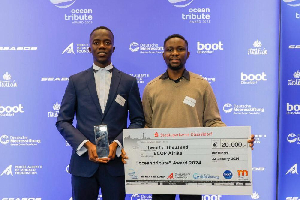West Africa's growing influence in the global maritime industry and its contributions to innovation and ocean conservation is rising.
This question and answer interview with Peter Busumprah, CEO of Ocean Rock Base and coordinator of ECOP Afrika Ghana highlights the role of BOOT Düsseldorf 2025 as a key platform for showcasing maritime advancements, fostering collaboration, and driving sustainable change.
The discussion explores the intersection of technology, sustainability, and regional contributions, positioning BOOT Düsseldorf as a central hub for shaping the maritime industry's future and promoting ocean conservation.
The interview also focuses on ECOP Afrika's contribution to ocean conservation. Mr. Busumprah touches on ECOP Afrika’s award-winning work and how it transforms ocean health and empowers local communities. Then it highlights the importance of collaboration among businesses, governments, and NGOs in ensuring the long-term sustainability of marine ecosystems.
Q: Kindly introduce us to what you do at ECOP Afrika and how has winning the Ocean Tribute Award at BOOT Düsseldorf transformed ECOP Afrika's approach to marine conservation?
Mr. Busumprah: As the Ghana Coordinator for Early Career Ocean Professionals Africa (ECOP), I focus on empowering young professionals in marine conservation through capacity building, advocacy, and networking. Winning the Ocean Tribute Award at BOOT Düsseldorf has greatly enhanced our visibility and credibility, enabling us to secure more partnerships and resources. This recognition has reinvigorated our commitment to fostering sustainable ocean practices and has inspired our community to engage more actively in marine conservation efforts.
Q: Can you describe the Ghana Ocean Climate Innovations Hub's most impactful project and how it bridges collaboration across African nations?
Mr. Busumprah: The Ghana Ocean Climate Innovations Hub's most impactful project focuses on restoring mangroves and seagrass, enhancing coastal resilience. By engaging local communities and collaborating with partners across Africa, this initiative fosters knowledge exchange and sustainable practices, strengthening regional networks and promoting shared solutions to combat climate change and protect marine ecosystems.
Q: What unique challenges do West African maritime ecosystems face, and how are innovative solutions addressing these issues?
Mr. Busumprah: West African maritime ecosystems face significant challenges, including overfishing, pollution, and climate change. Innovative solutions are emerging, such as community-led sustainable fisheries management, marine protected areas, and the use of technology for monitoring marine health. Collaborative initiatives among governments, NGOs, and local communities promote awareness and conservation efforts. As Ghana's coordinator for early career ocean professionals, I've witnessed the importance of education and innovation in addressing these pressing issues.
Q: How does indigenous knowledge contribute to your organisation's sustainable ocean management strategies?
Mr. Busumprah: As the CEO of Ocean Rock Base and project lead for the Ghana Ocean Climate Innovations Hub, I recognize the invaluable role of indigenous knowledge in our sustainable ocean management strategies. By integrating traditional ecological practices and local community insights, we enhance our conservation efforts, promote biodiversity, and foster resilience against climate change. This collaborative approach not only empowers local communities but also ensures more effective and sustainable management of our ocean resources.
Q: In what ways does the UN Ocean Decade support early career ocean professionals like yourself in driving meaningful change?
Mr. Busumprah: The UN Ocean Decade supports early career ocean professionals by providing platforms for collaboration, capacity building, and knowledge sharing. Initiatives like the Ocean Tribute Award recognize and amplify our efforts in driving innovative ocean solutions. As CEO of Ocean Rock Base and project lead for the Ghana Ocean Climate Innovations Hub, I leverage this support to engage communities, foster sustainable practices, and promote holistic approaches to ocean conservation, driving meaningful change for our planet.
Q: How do collaborative efforts between businesses, governments, and NGOs create more effective marine conservation outcomes?
Mr. Busumprah: Collaborative efforts between businesses, governments, and NGOs enhance marine conservation by pooling resources, expertise, and knowledge. These partnerships foster innovative solutions, promote sustainable practices, and drive community engagement. By aligning interests and goals, stakeholders can implement comprehensive strategies that address the complexities of marine ecosystems. As the project lead for the Ghana Ocean Climate Innovations Hub, I was honoured to receive the Ocean Tribute Award for our impactful initiatives in this collaborative framework.
Q: What technological innovations from West Africa are you most excited about in addressing ocean health and climate resilience?
Mr. Busumprah: I am excited about the Multifunctional Ocean Application developed by Ocean Rock Base where I served as the CEO, which leverages GPS technology to support ocean health and climate resilience in West Africa. This Application records essential data, such as catch details, fishing locations, and environmental conditions, which enhances our understanding of marine ecosystems. This innovative tool aids in mapping blue carbon biodiversity, crucial for carbon dioxide absorption and combusting climate change it contributes to a comprehensive Fisheries Atlas in Ghana that incorporates indigenous names and ecosystem insights.
Key outcomes include the creation of the Blue Carbon Biodiversity Atlas, Fisheries Atlas, recommendations for Marine Protected Areas, and enhanced data sharing among fishermen. Additionally, the application promotes ocean literacy, educating stakeholders on the importance of ocean protection, extending the project to countries like Cameroon, Nigeria, and Madagascar further strengthens regional collaboration, while the ocean literacy features educate stakeholders on the critical importance of ocean protection and sustainability.
Q: How does sustainable aquaculture fit into your broader vision for ocean ecosystem rehabilitation?
Mr. Busumprah: Sustainable aquaculture plays a crucial role in our vision for ocean ecosystem rehabilitation by promoting biodiversity, reducing pressure on wild fish stocks, and enhancing coastal livelihoods. By implementing responsible farming practices, we can restore degraded habitats, improve water quality, and support local communities. Our initiatives focus on integrating aquaculture with marine conservation efforts, fostering resilience in ocean ecosystems, and ensuring food security while protecting marine resources for future generations. Sustainable aquaculture is vital for a healthier ocean and thriving coastal communities.
Q: What specific strategies is ECOP Afrika implementing to combat illegal fishing in West African waters?
Mr. Busumprah: Members in ECOP Afrika working in government bodies draft policies that regulate mesh sizes, ensuring they are designed to protect juvenile fish and promote biodiversity. Additionally, they conduct inspections of both larger and smaller vessels to ensure compliance with these regulations, fostering responsible fishing practices.
Q: How can international platforms like BOOT Düsseldorf help amplify African marine conservation efforts?
Mr. Busumprah: Platforms such as Boot Düsseldorf play a crucial role in fostering essential collaborations in marine conservation by uniting individuals, organisations, and institutions with a shared interest in this field. By facilitating connections between innovators and potential donors, these platforms are vital not only for inspiring innovators but also for linking them with institutions eager to support marine initiatives globally, particularly in Africa, where resources for planning marine conservation are limited and often unavailable.
Q: What role do young ocean professionals play in reshaping global approaches to marine sustainability?
Mr. Busumprah: Young ocean professionals play a pivotal role in reshaping global marine sustainability by advocating for innovative solutions and inclusive policies. They enhance collaboration through diverse perspectives and local knowledge, fostering community engagement. As the Ghana Coordinator for early career ocean professionals endorsed by the UN Ocean Decade, I facilitate networking and knowledge sharing, empowering the next generation to drive impactful ocean conservation initiatives.
Q: Looking ahead to 2030, what are your most ambitious goals for ocean conservation in West Africa?
Mr. Busumprah: As CEO of Ocean Rock Base and project lead for the Ghana Ocean Climate Innovations Hub, my ambitious goals for ocean conservation in West Africa by 2030 include establishing comprehensive marine protected areas to safeguard biodiversity, promoting sustainable fisheries through community-led management, and enhancing climate resilience through restoration of coastal ecosystems like mangroves and coral reefs. We aim to foster regional partnerships for collaborative ocean governance, drive innovation in sustainable aquaculture, and raise awareness about the critical importance of ocean health. Our vision is a thriving, resilient marine ecosystem that supports communities and combats climate change effectively.
Click to view details



Press Releases of Wednesday, 25 December 2024
Source: Boot Dusseldorf

















